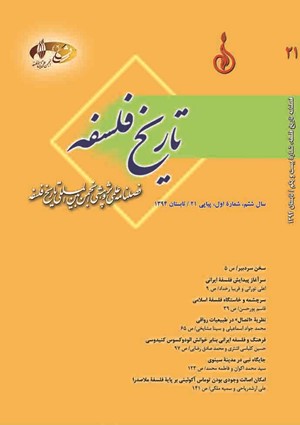جايگاه نبي در مدينه سينوي
محورهای موضوعی : Etymology of philosophical terms
1 - دانشگاه آزاد اسلامي
2 - دانشگاه آزاد اسلامي
کلید واژه: ابنسينا سياست نبي مدينه سينوي حاكم حكمت عملي باطنيگري,
چکیده مقاله :
ابنسينا بعنوان فيلسوف الهي، بحث از سياسيات را در خلال مباحث الهيات آورده و بظاهر در دستگاه فکري خود، اثر مستقل سياسي ننگاشته و آن را يکسره در حكمت عملي داخل نموده است. وي مصداق «حاکم افضل» را نبي و قوانين (نواميس) را وحي و سنت دانسته است و از آنجا که قبل از وي، فارابي در «سياست مدينه» بنايي کامل نهاده، نيازي به ارائه توضيح بيشتر در زمينههاي تأسيس شده نميبيند و باجمال به آن پرداخته و وارد جزئيات نگرديده است، اما در بخش مربوط به چگونگي انتصاب يا انتخاب حاکم و نيز تدوين قوانين (نواميس الهي) براي مدينه فاضله بتفصيل سخن گفته است. در واقع آن سياست نبويي را که فارابي پي افکنده بود، ابنسينا تکميل نمود.
As a divine philosopher, Ibn Sina has dealt with politics in his metaphysical discussions. Apparently, he has not written an independent work on politics and has considered it to be a part of practical wisdom. In his view, the prophet represents the “ideal ruler” and revelation and tradition represent the law. Since, before him, Farabi has discussed politics extensively in his al-Siyasah al-madaniyyah (Civil Politics), Ibn Sina does not see any need to provide more explanations in this regard and deals with this field in short without presenting the details. However, he has discussed the quality of choosing a leader and devising laws for his utopia extensively. In fact, he has completed the same prophetic politics that Farabi had initiated previously. The present paper briefly deals with Ibn Sina’s political system in order to clarify the place of the prophet in the hierarchy of his utopia. In this way, the quality of establishing a utopia based on the “definitive text” as the best method of electing a ruler is clearly illustrated. Moreover, the authors demonstrate how the nature of Ibn Sina’s view of the caliphate and the Prophet’s successor bring him closer to the Imamiyyah political philosophy.
